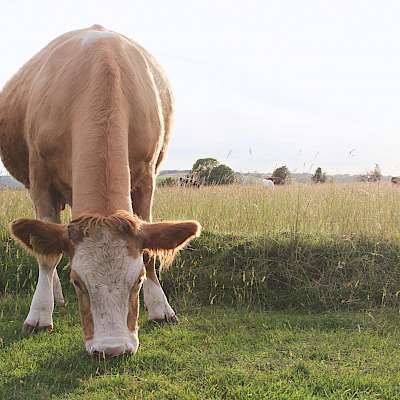We published a new report last week that shows that organic livestock farms certified by the Soil Association use far fewer antibiotics than the UK average. The survey, covering over 200 farms, found that the organic farms used less than a quarter of the amount of antibiotics used on non-organic farms. Newly published Danish data has also found much lower levels of antibiotic use in organic pig and dairy production than in non-organic production.

These findings confirm what we have long argued: that less intensive systems, like organic farming, are not only better for animal health but also result in less need for medicating livestock with antibiotics. This has huge implications; both for our legislators and for us as individuals and the food we choose to buy to feed our families each week.
Based on the conclusions reached in the Antibiotic use in Organic Farming; Lowering use through Good Husbandry report, the Alliance is calling for organic farming’s high husbandry standards to be recognised as a solution for lowering farm antibiotic use. We want to see higher health and welfare standards for all British livestock and antibiotics that are essential for human health to be limited to exceptional use.
As consumers, armed with this latest evidence, we can choose to spend our hard earned money on less but better meat - meat that has been reared without the need for unnecessary antibiotics – that supports a better, more sustainable way of farming for people and planet.
Antibiotics are a precious and finite resource. The overuse of antibiotics in human and animal medicine is undermining modern medicine’s ability to cure life-threatening infections. Globally the incidence of dangerous, pathogenic bacteria that are resistant to the effects of antibiotics is increasing. Ten million people a year could die from untreatable antibiotic-resistant infections by 2050, if we fail to take decisive action now.
But despite this unfolding crisis, worldwide it is estimated that 66% of all antibiotics are used in animals, not people. Much of this use is routine, enabling livestock to be kept in unhygienic and stressful conditions where disease spreads easily.
Organic standards aim to promote good health and welfare so that disease is exceptional rather than routine. By aiming to minimise disease, these standards are also likely to reduce the need for antibiotic treatments. Some key organic standards include:
- Access to fresh air and the outdoors
- Greater space allowed for each animal to move freely and express natural behaviours
- The rearing and farming of climate and landscape appropriate native and resilient breeds, including slower growing chickens
- Species appropriate diets eg. Grass fed/pasture raised cows, sheep and goats
British farmers have voluntarily cut their antibiotic use by nearly 50% in the last five years, which is very welcome, but these findings show that much lower use could still be achieved. Over 75% of farm antibiotics are used for mass medication in the UK, rather than for the treatment of individual sick animals. Organic farming has stricter rules on antibiotics, which do not permit routine use or preventative mass medication.
We hope that by examining the husbandry and antibiotic practices of high welfare systems, such as organic, we can better understand what specific welfare measures can help all livestock farmers go further in reducing their antibiotic use. Read the full report here.
